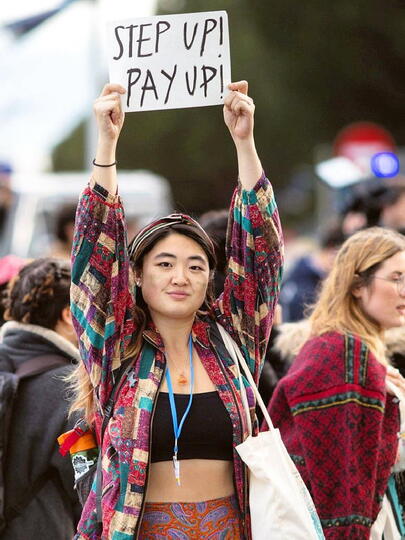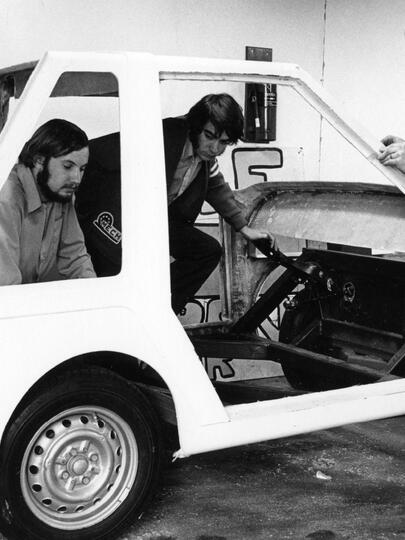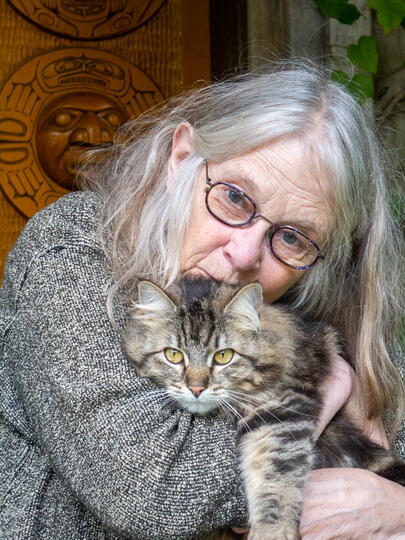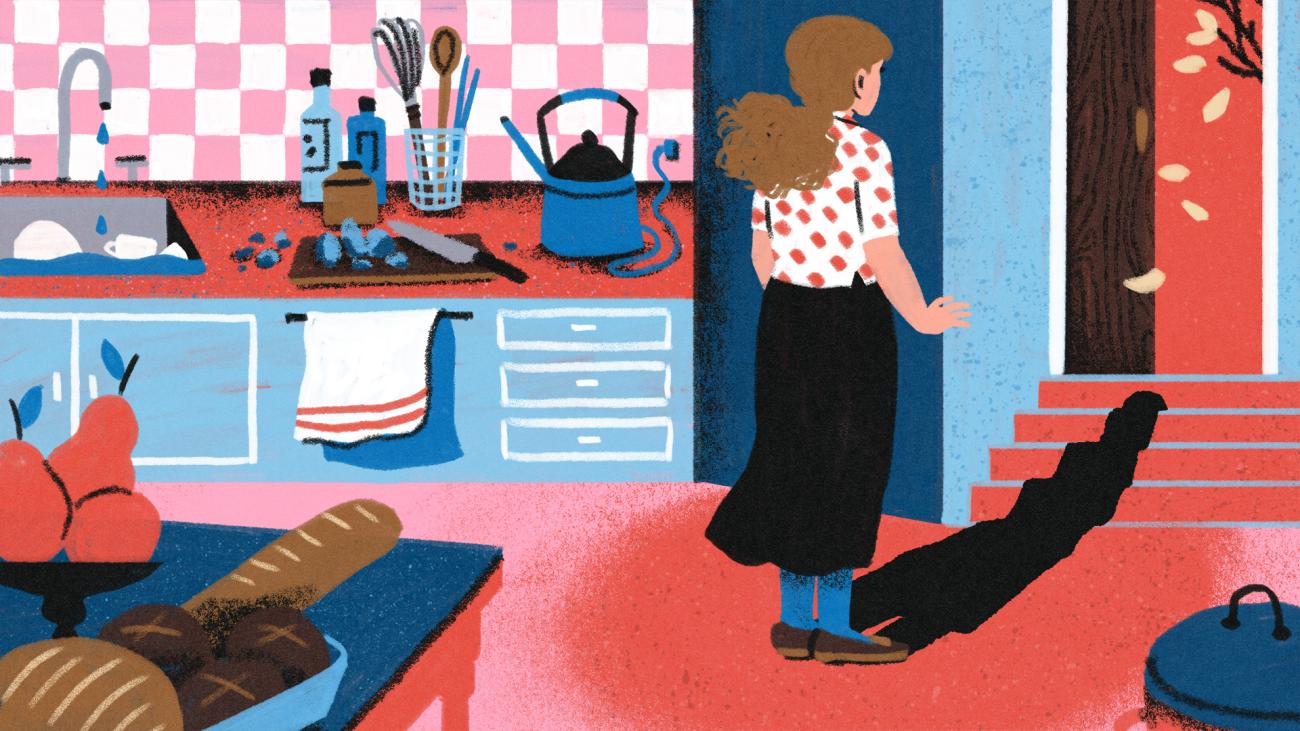Short Fiction
2024 Finalist: A Concurrence of Gentility
When we came to Canada from Singapore in February 1969, my parents bought a house in Burnaby, in a new subdivision that was previously a farm. Across the street, the old farmhouse had been recently acquired by the Willet family. Fruit trees grew in lush backyards, and everything on our tranquil cul-de-sac looked fresh and clean. Kindness and courtesy were palpable in this friendly community into which we felt enthusiastically accepted.
The neighbours took to calling our street a mini-United Nations. Both Mr. and Mrs. Melnyk had Ukrainian parents who were early homesteaders in Saskatchewan. They collected historical trivia and were always eager to share what they knew of the genealogies of famous people and the origins of place names in British Columbia. Mr. Campbell claimed to be a Scottish exile, “a proud highlander,” he said, with a wink at the Walkers. Mrs. Campbell wasn’t sure of her heritage. “My father always called us mutts,” she said, laughing. The Walkers were fifth and seventh generation English with roots in Ontario. They were among the seemingly few who had lived their entire lives on the Lower Mainland. The Nakamuras were second generation Japanese whose families were sent to the Alberta beet farms during World War II. They hosted the July 1st barbecue that became an annual tradition. The Willets – “rhymes with ‘millet’” – only shook their heads and said they were Canadian and never thought about such things.
The Melnyks organized a potluck supper to which everyone was asked to bring an “ethnic” dish. Mrs. Willet brought apple pie and Mr. Willet a case of beer. When he had had a little too much to drink, Mrs. Willet quickly and expertly shepherded the family home.
It was at this supper that I first spoke to Marcy Willet, who was my age. She was sitting quietly and demurely, barely ever raising her eyes, her hair coiled into a tight bun. The Walkers had been calling on Marcy and me to babysit their twin toddlers, and when the children came to us with their toys, I could see how happy Marcy was playing with them.
The Campbells lived beside the Willet farmhouse and Mr. Campbell said, on our first visit to their home, looking at me with a twinkle in his eye, that it was haunted. With its dark brown wood siding and gabled roof, you could imagine it resembled the customary Halloween image. The Willets had told them of lights that were on in the morning, doors that opened by themselves. The Campbells said they heard muffled thumps and sometimes shattering glass, although – they looked at each other with the faintest of smiles – these “might have been something else.”
The Walkers were our next-door neighbours. My mother would pass snow peas from the garden and plums from our tree over the fence, in exchange for Mrs. Walker’s lettuce and heirloom tomatoes. Once, over dinner at our house, Mrs. Walker said to Mr. Walker, “You should build us a garden shed like the one at the Willets.” Mr. Walker said, “Well, she was up on the roof with him when he was shingling it!” Mrs. Walker looked at my mother and grimaced.
Mr. Willet had a well-equipped workshop and built not only the shed, but trellises and boxes for their garden, with Mrs. Willet often working beside him. I would see her in overalls and gumboots, digging in the garden, planting, weeding and watering. The Willets always had produce to distribute to the neighbours. Mrs. Nakamura, on her part, sent for Japanese eggplant and broad bean seeds, then shared them with Mrs. Willet, who she believed had a greener thumb.
Marcy and I started classes at UBC in the fall of 1969. Sometimes we were on the same buses to school: the once-every-30-minute bus to Kootenay Loop and then the hour-long ride on the #14 to UBC. That was when Marcy Willet unfastened her hairpins and shook her reddish blonde curls over her shoulders, while flashing a cheeky smile. Apart from a fondness for racy jokes, Marcy was usually finishing her homework or studying for a test. I would be reading my way rapidly and methodically through the collection of paperbacks on the wire carousels in the Sedgewick Library.
On one such day, Marcy and I were on the high seats in the back row of the UBC bus when a young man got on. The last empty seat being the one between Marcy and the window, he squeezed in beside us with polite apologies. We inquired about his strong European accent, and he said he was an Austrian student travelling around the world and had many questions about Vancouver. It soon became obvious that I was in the presence of the goddess of flirtation. When she took his hand in hers, I turned discreetly to my book.
While we did not take the same courses, Marcy and I were both in the Arts faculty, and I began to see her quite often in the endless identical corridors of the Buchanan Building, with an entourage of young men engaged in some merriment or other. Some days I walked past them twice, having lost my sense of direction while trying to find the staircase. Marcy and I did not make eye contact, and we never spoke about it.
After the first year, I saw much less of her. I took French and Mandarin classes, determined to become proficient in three languages, and in my third year enrolled in the Honours program. She found various part-time jobs, waiting tables in restaurants near UBC, and serving at the concession in the Varsity Theatre on 10th Avenue. She longed to leave home and start her own family; I had set my mind on a doctorate in economics.
One day in the spring of our graduation year, I was walking home from the bus stop when I saw a police car in front of the Willet house. It turned out that Marcy had been missing for days, but her parents had not reported it because there had been many nights when she had returned home very late or not at all. I saw a brief notice in The Ubyssey in the following weeks that police had questioned two engineering students about Marcy Willet’s disappearance, but uncovered no new leads.
The Nakamuras decided to go ahead with the July 1st barbecue that year, with the agreement of the neighbours. Mr. Willet did not drink, and Mrs. Willet looked very grim and composed. Everyone was generous with their hugs and offers to help with whatever they could, and asked no more questions than were necessary.
In the fall, I began postgraduate studies at the University of Alberta, and became absorbed into those Edmonton social circles that were involved in provincial and international politics. Sometime in the 1980s my parents sent me a small clipping from a Burnaby community paper. The Willets had sold their house a few years back and told no one where they were going. The current owners, while excavating the backyard for an extension, apparently found traces of human remains buried in the ground.
When I went to see my parents that Christmas, I asked them about the Willets. “Who knew anything?” they said. “Why do you want to bring it up? It was so long ago.”
It is September 2023. I have been living in Vancouver since the late 1990s, when my parents moved out of their house. Yesterday I was listening to a podcast by an activist for the homeless, who had done interviews of residents of tent cities and encampments around the Lower Mainland. Abe Willet is a 78-year-old who had been a runaway at age 17. He began working on construction sites and eventually was able to buy an apartment in Calgary. He had been abused by his parents and experienced episodes of depression. At some point, he left his job, sold the apartment, and moved from one city or small town to another, unable to stay employed or settle in any one location.
“My father used to get drunk and hit me. Things got real bad, and I just couldn’t take it. The biggest regret in my life,” he said, “is that I had to leave my sister. My father abused her, sexually, yeah. My mother let him to do it. When I got a good job, a place to live, I came to BC to look for her. I found them in Burnaby, and they told me she had gone missing. My little sister Marcy. You know, I left her with them. I keep thinking, maybe she’ll show up here or some place like this.”
Marcy Willet? My heart beats louder as I am writing this. Marcy, with her red curls and smile; the congenial denizens of a placid neighbourhood that for years had been washed with nostalgic hues of fellowship and home: they were all a facade?
Who knew anything? Mr. and Mrs. Campbell with their conspiratorial glances and unfinished sentences? Mr. and Mrs. Melnyk – what did they file away with their histories? Mrs. Nakamura, who sought gardening tips from Mrs. Willet? Mr. Walker, who consulted Mr. Willet about his building projects and sometimes used Mr. Willet's workshop? Parents gossiped over the fence and kept secrets from the kids. What secrets did they share?
I had always hoped that one day, in that dim corner of my brain where Marcy Willet lives, there would be closure, but this is not it. Everyone who might have known has passed away or no longer remembers. That should be the end of it. But Abe Willet remembers, and I remember.
The alumni UBC Short Fiction Contest
This year marked alumni UBC’s first short fiction contest for alumni. A Concurrence of Gentility was chosen as one of three finalists from almost 100 entries. Many thanks to UBC’s School of Creative Writing and UBC Okanagan’s Faculty of Creative and Critical Studies for their support of our inaugural short fiction contest.
The jurors, all UBC alumni, were Annabel Lyon (author, director of UBC’s School of Creative Writing), Michael V. Smith (author, professor of creative writing), Danny Ramadan (Syrian-Canadian author), and Umar Turaki (writer and lecturer at UBC Okanagan’s Faculty of Creative and Critical Studies).

































